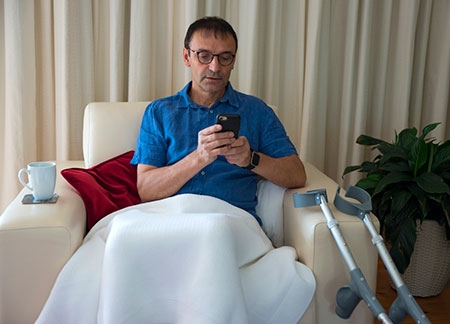It wasn’t that long ago that joint replacements, specifically hips and knees, stayed in the hospital for several days to recover prior to being discharged home. With the advancements in anesthesiology and nerve blocks, we began offering 23-hour joint replacements at The Orthopaedic Surgery Center at our main clinic in Pewaukee. These days, we have progressed further to same-day discharge for some of our total joint patients. Even total joint procedures performed at the hospital are only seeing patients spend one night barring any complications.With the onset of the COVID-19 pandemic and on-going bed shortages, even the hospital is pushing for total joint procedures to discharge the same day. Why the trend to get patients home sooner after major surgery? Read on to find out!
Total joint replacements are considered active recoveries. Unlike fractures or tendon repairs,patients are expected to be up walking around and getting the replaced joint moving right away with few exceptions. In fact, part of the discharge criteria is being cleared by a physical therapist when they believe you are able to complete activities of daily living on your own at home with the help of a support person. Postoperative discomfort is better controlled with the initiation of nerve blocks specific to the operative leg that continue to control pain long after you have awoken from the general anesthetic. Better pain control allows patients to get moving more quickly and head home without spending multiple nights at the hospital or gobbling down narcotic medication as soon as you are home.
Recent research has shown that older adults proceeding with elective surgery are actually rehabilitating better with less complications in their humble abodes rather than enduring those week-long hospitalizations. Patients who are still admitted tend to be less mobile, which can lead to an increased risk of deep vein thrombosis (or blood clot). When patients are discharged home, they start moving more often which helps improve blood circulation. Leaving the hospital sooner than later also decreases the risk of developing a hospital-acquired infection post-operatively. Unfortunately, hospitals house patients with all kinds of conditions, including infections. If 2020 has taught us nothing else, it is that infections can spread rapidly. The sooner you can get home to where the germs are far less abundant, the greater chance you will have at recovering without complication. When you are inpatient, the nursing staff is required to check on you at regular intervals to confirm comfort, help with bathroom trips, and administer medications. This care, though helpful, often results in interrupted sleep. Rest is imperative for healing, and the best rest happens at home.
Certainly, recovering from a joint replacement surgery at home is not something to take lightly.In order to help you succeed, a Stepping Forward class is required of all patients (and their support persons) having their joint replacement in the hospital setting. Through this class,patients learn more about what to expect during the hospital stay associated with their procedure as well as what recovery will look like. Nurses, physical therapists, and social workers are present to answer questions and explain postoperative complications that could arise and how to most effectively prevent them. Home recovery can help save you cost and complication and get you back to some semblance of normal more quickly.
This blog is written by one of our very own-Morgan. She is a certified athletic trainer working as a medical assistant with our providers each and every day in our clinic. She obtained a bachelor's degree in athletic training from Carroll University in Waukesha and a master's degree in Kinesiology from Michigan

